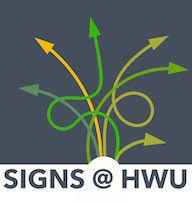Milestones
- 1990s: HWU first started to offer some basic sign language interpreter training for working Scottish interpreters.
- 2005: Start of broader sign language research/teaching initiatives at HWU to include programmes in BSL linguistics, BSL Train the Trainers, Deaf Managers, as well as interpreting.
- 2010: Celebration of our first PhD graduate.
- 2021: Celebration of our first deaf PhD graduate.
- 2013-2017: A period of significant growth of staff, PhD students, honorary associates and research assistants, and extension into Deaf Studies research.
- 2016-2023: Implementation of in-house interpreting services, growing from 1 to 4 interpreters, mirroring the growing number of deaf members of the team.
- 2020: Official naming and formation of SIGNS@HWU as a distinct research cluster.
- 2021: Launch of a dedicated website.
What we have achieved:
- 60+ completed or ongoing research projects (including PhD projects)
- 11 PhDs completed since 2010 (https://signs.hw.ac.uk/completed-phds/)
- Fluctuating membership between 20 and 30 since 2017, indicating a stable yet dynamic research community.
- We are a global hub attracting visiting scholars who come to spend at least one month with us (five in 2022-2023).
Our projects
While many know us for our work in interpreting or sign linguistics, our academic work extends well beyond these areas into comprehensive Deaf Studies. Our research is diverse, covering a broad array of subjects. Current projects range from the study of facial expressions in BSL, the experiences of deaf female Indian migrants and deaf lesbians in London, interpreting in situations involving the police, law, social work and mental health, the identities of deaf youth and children’s stories in BSL, online communication between deaf people in Japan and the UK, International Sign practices and interpreting, sign language on TV, and more. Some projects are conducted within research teams, such as a new study on deaf experiences with various technologies and the recently concluded MobileDeaf project. Other projects are pursued individually.
Some facts about us
Deaf and practisearcher leadership: We are a truly deaf-led group, and the majority of the group is deaf. Our research initiatives are le d by experts who are deeply familiar with the challenges and advancements in the fields of Deaf Studies and sign language interpreting studies, ensuring deaf-centric research and practice. We also conduct applied research as practisearchers (=researchers who are also practising interpreters) which has directly influenced professional training, enhancing best practices in sign language translation and interpretation.
Community and collaborative networks: We partner with a wide array of organisations, including governmental, non-profit, and educational sectors, where we provide consultancy, collaborate on projects, and impact policy and practice. Our impactful work spans across continents, with completed and ongoing projects in the UK, Australia, Indonesia, Kenya, and Denmark. We are connected with organisations where we sit in boards or expert groups, or have (had) positions as chairs, such as the British Deaf Association, the World Federation of the Deaf, the World Federation of Sign Language Interpreters, the Association of Sign Language Interpreters and Translators, and schools like Frank Barnes in London and St. Roch’s in Glasgow.
Transdisciplinary research: Our transdisciplinary approach to research blurs boundaries between disciplines, including geography, anthropology, applied linguistics, sociolinguistics, translation and interpreting studies, and business studies.
Innovative methodologies: We adopt community participatory research approaches, and we specialize in visual research methods, including photo elicitation, language portraits, mental mapping, ethnographic filmmaking and participatory filmmaking, to deepen our research and community engagement. These approaches not only enrich our studies but also strengthen community connections and feature in public engagement, ensuring our work is both innovative and impactful.
Engagement-driven research: We aim to have an even more proactive approach to engagement-based research, responsive to the evolving interests within deaf communities. We plan to foster projects that emerge from our interactions with deaf organisations. If you are interested in working with us, do get in touch!
